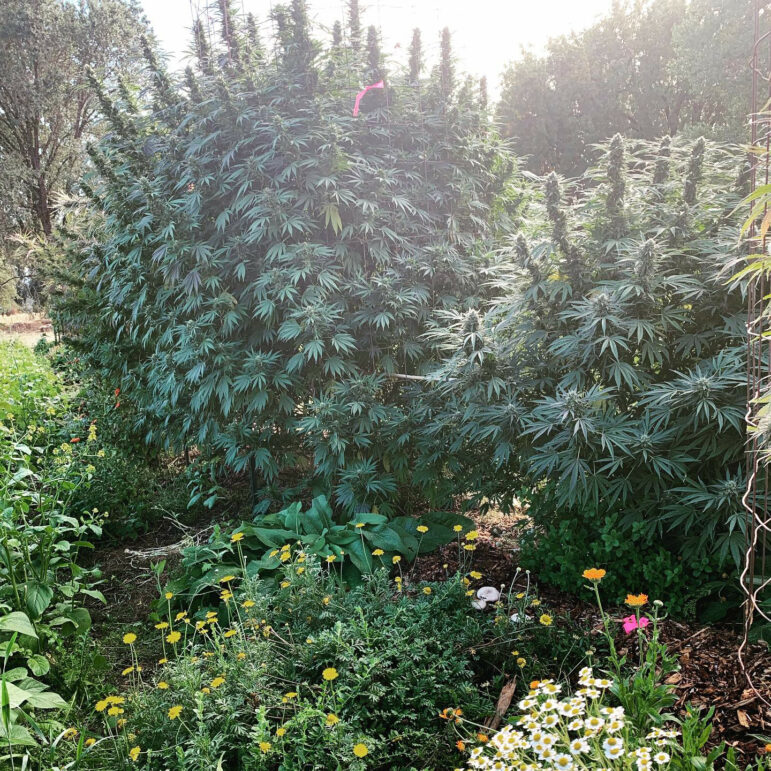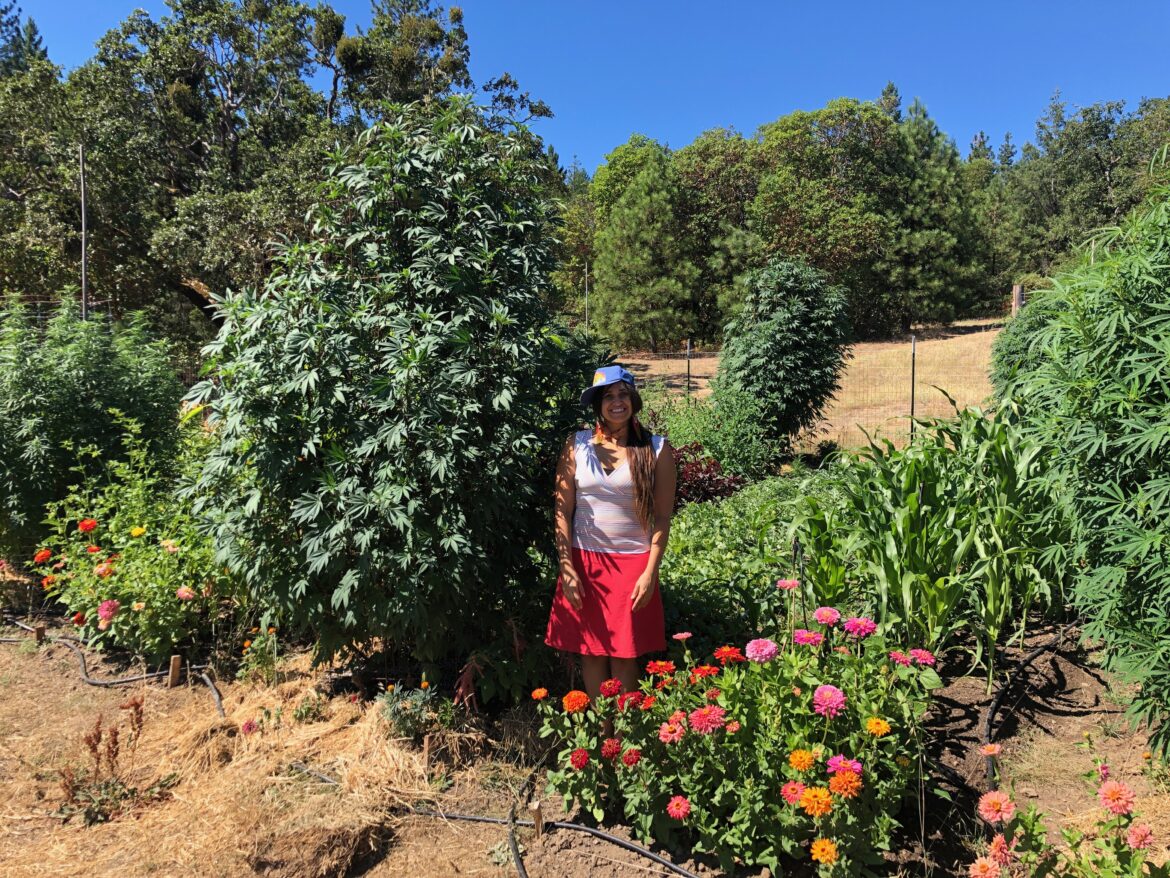MENDOCINO COUNTY, CA, 7/19/2022 – Some Mendocino County cannabis cultivators who have committed to environmentally sustainable farming practices became the first to receive sizable grants from the California Department of Fish and Wildlife’s (CDFW) new Qualified Cultivator Grant Program in July. As licensed cultivators face financial challenges in the regulated cannabis market, this $6 million in possible funding, available until April of 2023, is designed to help small farmers who prioritize such sustainable farming practices as outdoor growing, water collection and retention, and cultivating diverse gardens.
“[These cultivators] are going beyond the minimum of what you need to get your local permits and your state license,” explained Ukiah-based consultant Chantal Simonpietri, who collaborated with the Mendocino County Resource Conservation District (MCRCD) to secure a $1,388,181 grant for three local cannabis farmers. In her words, they’re “living the homestead lifestyle with the least impact possible, in a way that still supports what they need to do on the land.”
Individual farms and farmers can’t apply for this funding opportunity, provided through CDFW’s overarching Cannabis Restoration Grant Program, directly; only agencies, nonprofits, or tribes are eligible. Simonpietri wrote the grant application for farmers who partnered with the MCRCD, a public agency fostering stewardship of our local landscapes. Sun+Earth, a nonprofit providing organic certification for partner farms (including at least 35 in California) that prioritize regenerative practices and community engagement, was the other direct grantee in this first round of funding. The collective received $395,643 for planning and capacity-building to support sustainable cultivation practices in its partner farms.
CDFW’s grant program was established with the goal of alleviating some burdens of prohibitive licensing and permitting costs for small, legal cannabis farms that share its priorities of environmental caretaking and healthier watersheds.
“This Qualified Cultivator opportunity is really just our way of trying to reach out and talk to the growing community and work with them, to see if we can help them be successful,” CDFW’s Acting Cannabis Program Director Corinne Gray told The Voice. “And every time we have a conversation, I feel like we learn something new about what those struggles are. We’re still thinking about ways to help the community succeed.”
When CDFW began to realize how cost-prohibitive licensing and permitting could be for small cultivators, it hired Maggie Romo, a senior environmental scientist who works closely with grantees on funding opportunities. She helped brainstorm and develop the program in 2020, and now speaks with cultivators and eligible entities from the beginning of the consultation process to the program’s pre-application and application phases. According to Simonpietri, Romo encourages a “holistic” approach to a given farm’s goals.
“The term we put to it was a ‘wish list,’” Romo told The Voice. “A lot of the cultivators that we’ve come across want to do right by their practices. Especially with drought becoming the rule, not the exception, they’re seeing the direct impacts of water scarcity and what that means across not just where they’re cultivating, but on their whole lands, and how it ties into the watershed.”
CDFW has received 13 submissions for funding from nonprofits and one from a public agency, Romo said. These are in various stages of completion; Some $4.2 million remains to be allocated.
While partnering with eligible agencies can be tricky for individual cultivators, there are avenues available. For example, the grant awarded to the MCRCD will support three cannabis farmers in the South Fork Eel River watershed on water conservation projects, embracing the concept that these farms’ success can benefit the county as a whole. The money will allow Char C (a farm run by Nicholas Hoesing) and HappyDay Farms (run by Lito and Casey O’Neill) to install 167,000-gallon steel water tanks on each of their properties to collect and store rainwater with solar-power water pumping systems; to design and install bioswales, which are depressions in the soil that they’ll plant with native pollinator-friendly plants to store runoff that contributes to groundwater retention; to update their irrigation systems throughout their farms; and to prepare or revise required California Environmental Quality Act (CEQA) documentation in order to receive their annual state licenses, rather than just a provisional license. (The CEQA process is exhaustive and can be extremely costly).
Simonpietri said she spent at least 100 hours readying these grant application materials, but also that the payoff was worth it to gain a better understanding of the program and aid other cultivators. Actually receiving the funding itself was a welcome surprise, she told The Voice.
Cannabis cultivator Casey O’Neill of HappyDay Farms had already worked with Simonpietri to submit his CEQA documentation, which likely will not be reviewed by Mendocino County until September due to backups in the process. Though O’Neill won’t be reimbursed for documentation work he and Simonpietri already completed, he felt it was worth it to be one of the first to attempt to gain an annual license from the state and help other farmers work out the system’s kinks. (Simonpietri said she has since completed 11 of these applications total for Mendocino County farmers). And now the grant funding received by the MCRCD will almost entirely cover CEQA costs for Hoesing, whose farm is just down the road from the O’Neills.
“I tend to operate in the space of the first mover,” O’Neill told The Voice. “In everything I do, I want to be conscious of figuring out pathways for how it’s going to work moving forward with relationships with the regulators and policymakers — and how it’s going to work on the ground for the farms.”
O’Neill has also been a board member with Sun+Earth since the nonprofit’s inception. He said the organization will begin reaching out to its California partner farms, using the grant funding to identify plans and projects that may need support.

Blaire AuClair of the Round Valley farm Radicle Herbs is a Sun+Earth partner; she wrote a letter of support recommending the collective for the grant funding. Sun+Earth rewards farms’ existing regenerative practices — for example, AuClair and her husband reduce water usage through mulch; engage in no-till agriculture to promote carbon sequestration in their soil; and plant a diverse array of vegetables, perennials, and other plants to foster more nutrient-rich soil and lessen erosion.
Partnership also helps farms in their business practices. Monique Ramirez of Sunbright Gardens, a small farm with a cottage-size license in Covelo, said the group has helped her sell more outdoor, sun-grown cannabis, thus contributing to fostering a like-minded network.
“We’re really grateful for Sun+Earth and the Weed Like Change campaign for helping us break through that barrier and get us in the door to give us connections to some amazing retailers that really value the sun-grown cannabis,” she said.
Ramirez founded the Covelo Cannabis Advocacy Group in 2017 and is the former vice president of the Mendocino Cannabis Alliance, helping to empower small cultivators to communicate their needs during tumultuous policy discussions. She said at its height, the Covelo Cannabis Advocacy Group had 30 active members going through the licensing process; but an estimated seven members have decided to take a break from cannabis, move away, or leave the industry entirely, while even more are questioning the viability of continuing their work given the financial strain.
Despite her advocacy, Ramirez recognizes that some of these issues could fall beyond the scope of what community organizations or grant funders can solve. She’s looking with concern to 2023, when Type 5 licenses for large cannabis producers will become available.
“It’s just kind of alarming to me,” she said. “It just will open up more opportunity for large corporations to continue to strangle the small farms that really can’t compete with the kind of marketing dollars that those companies have.”
As many have discovered, maintaining a licensed cannabis farm is costly, let alone prioritizing farming that avoids a detrimental impact on the land.
“We fortunately have been able to sell quite a lot of our product, but have still needed the assistance of our family to help us continue to pay our mortgage,” AuClair said. “So, it’s really hard — and we’re continuing to do it because we love farming and we love growing cannabis, and we believe in creating really good medicine for people.”
O’Neill said HappyDay Farms has been “pinched” too. But he hopes that opportunities like this will inspire other farmers to reach out to neighbors, nonprofits, and local agencies in their communities and build a network that can support both a thriving local cannabis economy and a healthy environment.
“In a time when the cannabis market feels very difficult and there’s a lot of struggle and a lot of trauma that still hasn’t been unpacked from the war on drugs, and people are having a hard time, this feels like a very bright point,” O’Neill said. “It feels like a pivot to a restoration economy that has great potential for our rural community .. It’s definitely a milestone in a long journey.”
More information about the Qualified Cultivator Funding Opportunity is available here.




